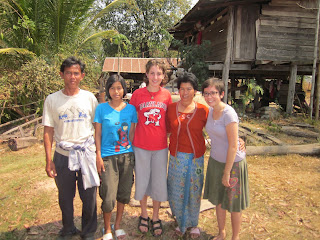Just last week I was in Baw Kaew, a protest village in Northeastern Thailand. There, villagers are continuing their 30-year struggle against the Thai government for taking over their land to develop a eucalyptus tree plantation. The protest village is illegally set up in the midst of eucalyptus trees. Back in the 1970’s as part of the national development plan, the government believed they were aiding reforestation by planting eucalyptus as a cash crop, which expanded industry. In reality, the plantation took over local villagers’ farmland.
This past unit looked at the impact of government policies on land. In addition to visiting Baw Kaew, we had a home stay in a forest village community named Toong Lui Lai. Near the forest village, the government established area asthe National Forest Reserve and then later the Wildlife Sanctuary, which designated land for preservation by arbitrarily drawing borders that overlapped with local villagers land. Subsequently, villagers have been arrested and charged for trespassing while farming for what villagers believe is their land. To give voice to their struggles, both Toong Lui Lai and Baw Kaew communities have united with the Isaan Land Reform Network of Thailand to go protest in Bangkok and ultimately to help them attain legal community land titles.
Today, I find myself back in the city considering the greater implications of these villagers’ long-term struggle against the government’s policies and actions. Considering the issues from the villagers’ perspective, it is easy to vilify the government and its policies. The government policies have created challenges to attain adequate living conditions and retain their means of livelihood and subsistence. Development and globalization often times jeopardizes the human rights of people as well as the sustainability of communities. The community visits show thetrickling down affect of policy on the community members. The networks, NGOs and community organizers give voice and legitimacy to the people’s problems. . As I think about the bigger picture, I am questioning the roles and responsibilities of the government to its people in causing and curing these larger issues.
When I begin to understand the concerns of the communities I visit, the roles and responsibility of government is becoming clearer. A mentor here explained that when thinking about change, it is important to first understand the root of the problem and how it functions. I also think it is important to understand the system by which policies are shaped and formed, because in fact they do affect the people. Both understandings are needed to address inadequacies from the top-down policy level.
The eucalyptus trees in Baw Kaew village.











